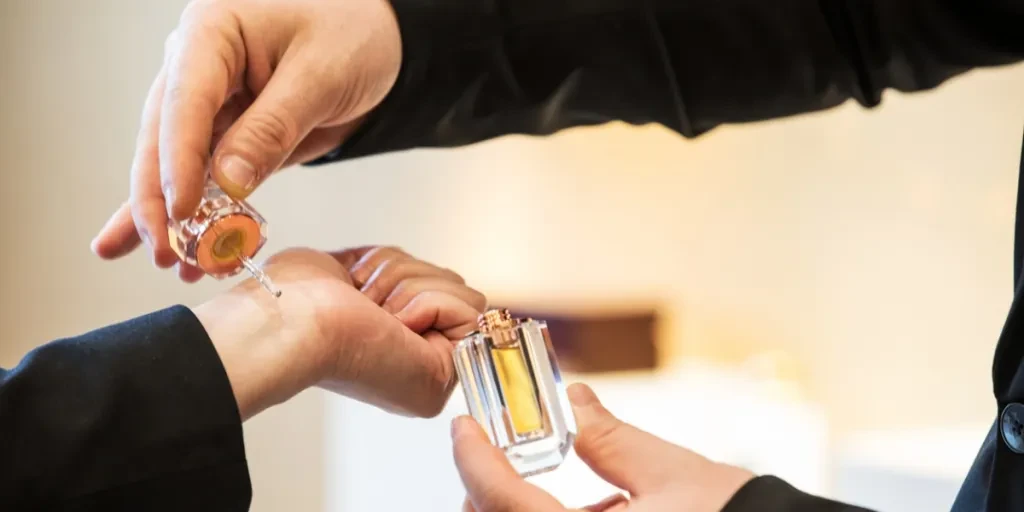Oud perfumes, sometimes called “liquid gold” for their occasionally lavish prices, are popular for their warm, rich, and woody scents. They often have deep, leathery tones with a hint of smokiness, giving them a similar intensity and luxuriousness as musk or amber fragrances.
But if you’re new to the world of oud, it can be intimidating to know what you’re looking for, especially as the prices start to rise. That’s why we’ve written this guide to walk you through the ins and outs of this sought-after ingredient and why it makes some of the finest perfumes one can buy.
Sommario
What exactly is oud?
A brief look at oud’s history
How perfume makers craft oud perfumes
1. Finding the right trees
2. Turning wood into oil
Che odore ha l'oud?
Why is oud so expensive?
How long does oud last?
How to sell oud in stores
Arrotondare
What exactly is oud?

vecchio is a highly fragrant oil derived from tree resin from the Aquilaria tree, which grows in Southeast Asia. These trees are otherwise pretty ordinary, but something amazing happens when a certain mold infects them: they go into survival mode, producing a dark, aromatic resin in an attempt to defend themselves. This resin is what experts call agarwood or oud.
A brief look at oud’s history
Knowledge of these oils has existed for centuries, dating back to around 1400 BC. Even the Sanskrit Vedas mentioned oil as a symbol of wealth and luxury. To this day, people in the Middle East burn oud chips on special occasions, filling their homes with its warm, smoky aroma, while in India it’s used as a fragrance for traditional medicine.
How perfume makers craft oud perfumes

As you might expect, making this opulent ingredient isn’t easy and involves a number of specific steps:
1. Finding the right trees
First, makers need to find Aquilaria trees that produce resin (fun fact: only about 2% of these trees do!). Skilled harvesters look for signs like darkened heartwood or subtle changes in scent. Once they find the right tree, they carefully extract the resin-rich wood.
Però, wild agarwood is rare nowadays. Many producers now rely on sustainable plantations, where Aquilaria trees are inoculated with mold under controlled conditions. This is not quite the same as nature doing its thing, but it’s a great way to meet demand without harming the environment.
2. Turning wood into oil
Here’s where the real magic happens. The experts chip the wood into small pieces and soak them in water – sometimes for weeks – to help release the resin’s aromatic compounds. Then, they distill the resin using steam or heat, which is very slow (it may take weeks or even months). However, the result – a few precious milliliters of pure oud oil – is worth it.
Che odore ha l'oud?

If you’ve never smelled oud before, describing its exact scent can be tricky. Imagine something deep and earthy but also smoky and slightly sweet, maybe even a little leathery. Unlike perfumes, which are more about being light and pretty, vecchio is bold and demands attention.
And here’s the kicker: no two ouds smell the same. Cambodian oud, for instance, is sweeter and more resinous, while Indian oud is drier and woodier. The scent also depends on how the resin is aged and the oil extracted. In short, every bottle of oud is unique.
Why is oud so expensive?

Oud can indeed be pricey, and is maybe even one of the most expensive fragrances today. Agarwood costs USD 100,000 per kilogram because it’s rare. Remember how only a small percentage of Aquilaria trees produce resin? This is one of the major reasons why vecchio è così costoso.
Then, there’s the time factor. Resin doesn’t just appear overnight; it can take decades for a tree to produce enough resin for makers to harvest. On top of that, harvesting oud also needs a high level of craftsmanship. From identifying the right trees to distilling the oil, every step of oud production requires skill and patience. And don’t forget demand.
vecchio has gone global, with luxury brands and niche perfumers incorporating it into their collections. And where there’s high demand and limited supply, the prices will always be high.
How long does oud last?

Oud fragrances are in a league of their own when it comes to longevity. A single application can last 12 hours or more, and its sillage (that’s the trail it leaves in the air) is nothing short of impressive. This also means that oud is quite popular as a fixative in perfumes because it helps make scents last longer.
Inoltre, profumi oud – which are more stable and less likely to break down over time, resisting oxidation – also come with longer shelf lives, especially compared to lighter fragrances.
How to sell oud in stores
Selling oud perfumes isn’t like selling the average fragrance. It’s a luxury item, so the brand’s approach needs to reflect that. Here are a few tips:
- Offer a range: Not everyone is ready for pure oud oil. Stock blended oud perfumes for newcomers and save the pure stuff for connoisseurs.
- Educare i clienti: Many people may not have heard of oud or understand why it’s so special. Take the time to explain its history, production, and unique qualities.
- Evidenzia la sostenibilità: Ethical sourcing is a big deal these days. Partner with suppliers that prioritize sustainability and ensure customers know the brand sells responsibly sourced oud
Arrotondare
Oud is a unique and rare fragrance that tops the charts for its earthy and musky smell. Although it’s quite expensive, that’s only because of its material rarity and the time it takes to prepare. However, many consumers believe the long-lasting scent is worth the price, and it therefore makes a great addition to any luxurious perfume store.
Just remember, when selling oud, tell potential customers the story behind each bottle and this ancient scent’s mystical past – it’s likely they’ll soon be enchanted.




